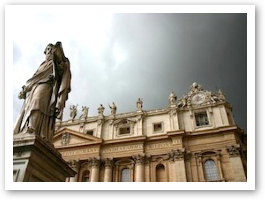Religion in the public square
- FATHER RAYMOND J. DE SOUZA
Thanks to Iceland's volcano, I was stranded here in Rome for a few extra days.
 |
That's hardly a sacrifice, and it allowed me to attend a most promising "conversation" sponsored by Canada's embassy to the Holy See.
The conversation was about "religion in the public square in Canada," and the very fact that it took place speaks well of Canada's ambassador here, Anne Leahy, and our foreign ministry.
Part of the embassy's celebration of 40 years of full diplomatic relations between Canada and the Holy See, the conversation brought together the Holy See's "foreign minister," Archbishop Dominique Mamberti, and two Canadian experts on the role of religion in public life: Solange Lefebvre, a professor of religion, culture and society at the University of Montreal and Iain Benson, a constitutional lawyer and former executive director of the Centre for Cultural Renewal.
The combination of a French cleric, a Canadian diplomat, a francophone professor from Montreal and an anglophone constitutional lawyer from Toronto made for a fascinating exchange on various controversies on both sides of the Atlantic. Both in France and in Quebec, recent years have produced intense controversies on the place of religion in public life, especially in regard to religious symbols and the role of religion in public schools. Yet in English Canada too there has been no shortage of conflicts about the role religion should play in our common life, and to what extent the state should be the arbiter of that question.
Archbishop Mamberti playfully compared the current situation of religion to smoking. Just like smoking, religion is thought by many to be something legal but dangerous, to be reserved to private life and increasingly restricted in public life. The insistence that smokers not contaminate non-smokers with secondhand smoke is analogous to the demand by atheists and agnostics to be free from any exposure to religion in our common life together. The comparison is not farfetched. Just as it is now illegal in some jurisdictions to smoke, for example, while driving children in your own car, there are mainstream voices who seek practical restrictions on the religious instruction parents may give their own children.
While both Lefebvre and Benson surveyed Canadian cases where religion, law and politics intersect, it was Mamberti who observed that in the relations between nations, religion is a factor that cannot be ignored. And for that reason it is important that Canada's diplomats were open to hosting the kind of conversation that took place here on Tuesday.
Religion is a delicate subject for Canada's foreign service. Diplomats are expected to be expert in everything from local customs to the international monetary system, but figuring out how knowledge of religion should be incorporated into their training is still a work in progress. Yet without knowledge of religion, and the various issues that are raised by religious believers in public life, it is not possible to think productively about immigration, security or diplomacy.
The Obama administration has already signalled a shift in its rhetoric, preferring to speak of "freedom of worship" rather than "religious liberty." The former restricts religion to acts of worship alone, while the latter recognizes that religious believers and their communities have a right to participate fully in our common life. |
Since 9/11 it is often observed that religion is a major fact in geopolitics. But that is to be at least 20 years behind history. The most important events in late 20th century geopolitics were essentially religious and both took place in 1979 – the return of Ayatollah Khomeini to Iran in January, and the return of Pope John Paul II to Poland in June. The remainder of the century was dominated by what was set in motion by those events – the rise of Islamic radicalism in the Middle East with the consequent Islamicization of the ArabIsraeli conflict, and the peaceful defeat of communism and subsequent reunification of Europe.
In the 21st century, religion is likely to play a greater role in world affairs, not a lesser one. Our diplomats need to be able to discuss religious liberty and religious participation in public life with both sophistication and seriousness, for a more religious world brings both light and shadows.
The Obama administration has already signalled a shift in its rhetoric, preferring to speak of "freedom of worship" rather than "religious liberty." The former restricts religion to acts of worship alone, while the latter recognizes that religious believers and their communities have a right to participate fully in our common life. It is a bad sign that the American administration is choosing a narrow view of religion in its foreign policy. It is a good sign that, at least here at the Holy See, Canada's representatives are broadening their horizon.
![]()
 This is Meaghen Gonzalez, Editor of CERC. I hope you appreciated this piece. We curate these articles especially for believers like you.
This is Meaghen Gonzalez, Editor of CERC. I hope you appreciated this piece. We curate these articles especially for believers like you.
Please show your appreciation by making a $3 donation. CERC is entirely reader supported.

Acknowledgement
Father Raymond J. de Souza, "Religion in the public square." National Post, (Canada) May 13, 2010.
Reprinted with permission of the National Post and Fr. de Souza.
The Author
Father Raymond J. de Souza is the founding editor of Convivium magazine.
Copyright © 2010 National Post



